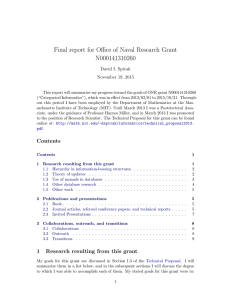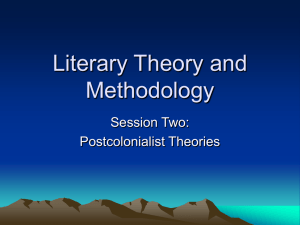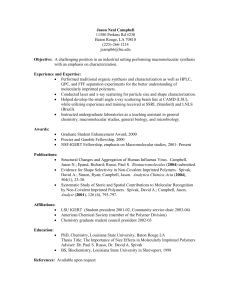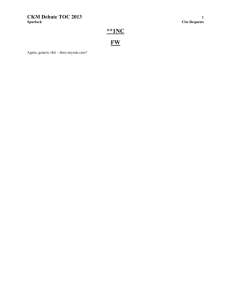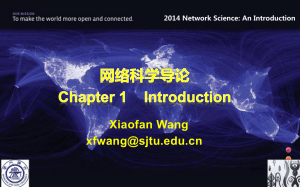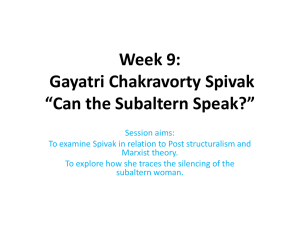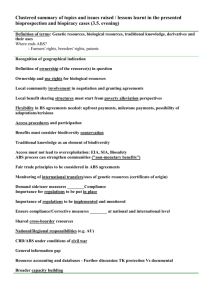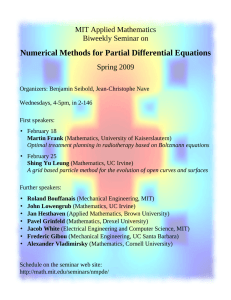David I. Spivak
advertisement
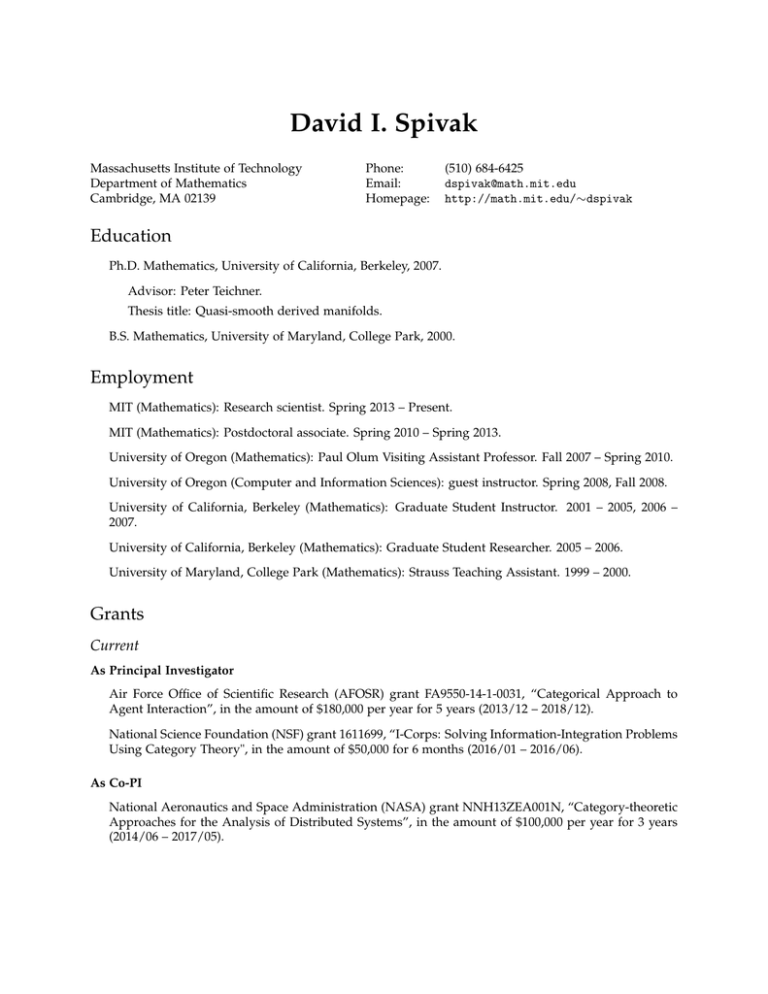
David I. Spivak Massachusetts Institute of Technology Department of Mathematics Cambridge, MA 02139 Phone: Email: Homepage: (510) 684-6425 dspivak@math.mit.edu http://math.mit.edu/∼dspivak Education Ph.D. Mathematics, University of California, Berkeley, 2007. Advisor: Peter Teichner. Thesis title: Quasi-smooth derived manifolds. B.S. Mathematics, University of Maryland, College Park, 2000. Employment MIT (Mathematics): Research scientist. Spring 2013 – Present. MIT (Mathematics): Postdoctoral associate. Spring 2010 – Spring 2013. University of Oregon (Mathematics): Paul Olum Visiting Assistant Professor. Fall 2007 – Spring 2010. University of Oregon (Computer and Information Sciences): guest instructor. Spring 2008, Fall 2008. University of California, Berkeley (Mathematics): Graduate Student Instructor. 2001 – 2005, 2006 – 2007. University of California, Berkeley (Mathematics): Graduate Student Researcher. 2005 – 2006. University of Maryland, College Park (Mathematics): Strauss Teaching Assistant. 1999 – 2000. Grants Current As Principal Investigator Air Force Office of Scientific Research (AFOSR) grant FA9550-14-1-0031, “Categorical Approach to Agent Interaction”, in the amount of $180,000 per year for 5 years (2013/12 – 2018/12). National Science Foundation (NSF) grant 1611699, “I-Corps: Solving Information-Integration Problems Using Category Theory", in the amount of $50,000 for 6 months (2016/01 – 2016/06). As Co-PI National Aeronautics and Space Administration (NASA) grant NNH13ZEA001N, “Category-theoretic Approaches for the Analysis of Distributed Systems”, in the amount of $100,000 per year for 3 years (2014/06 – 2017/05). David I. Spivak 2 Previous As Principal Investigator Office of Naval Research (ONR) grant N000141310260, “Categorical informatics,” in the amount of $180,000 per year for 3 years (2013/02 – 2015/10). Office of Naval Research (ONR) grant N000141010841, “Categorical Information Theory,” in the amount of $120,000 per year for 3 years (2010/06 – 2013/05). Office of Naval Research (ONR) grant N000140910466, “Databases and Networks,” in the amount of $100,000 per year (2009/01 – 2010/06). Honors and awards Outstanding Graduate Student Instructor (UC Berkeley 2002). VIGRE fellowship (UC Berkeley 2000-2001). Graduated Magna Cum Laude, and with Honors in Mathematics (U. Maryland 2000). Outstanding Senior Award (U. Maryland 2000). Carol Karp award for Outstanding Logic student (U. Maryland 2000). Publications, preprints, and presentations Book Spivak, D.I. (2014) Category Theory for the Sciences. Cambridge: MIT Press. 486 pages. Journal Articles Vagner, D.; Spivak, D.I.; Lerman, E. (2015) “Algebras of Open Dynamical Systems on the Operad of Wiring Diagrams”. Accepted for publication: Theory and Application of Categories. Available online http://arxiv.org/abs/1408.1598 Giesa, T.; Jagadeesan, R.; Spivak, D.I.; Buehler, M.J. (2015) “Matriarch: a Python library for materials architecture.” ACS Biomaterials Science & Engineering, http://pubs.acs.org/doi/full/10.1021/ acsbiomaterials.5b00251. Brommer D.B.; Giesa T.; Spivak, D.I.; Buehler, M.J. (2015) “Categorical Prototyping: Incorporating Molecular Mechanisms into 3D printing". Nanotechnology, article reference: NANO-108127. Spivak, D.I. (2014) “Database queries and constraints via lifting problems.” Mathematical structures in computer science. Available online: http://arxiv.org/abs/1202.2591 Spivak, D.I. (2012) “Functorial Data Migration”. Information and Communication. Vol 217, pp. 31 – 51. Available online: http://arxiv.org/abs/1009.1166 Giesa, T.; Spivak, D.I.; Buehler, M.J. (2012) “Category theory based solution for the building block replacement problem in materials design”. Advanced Engineering Materials. DOI: 10.1002/adem.201200109 Spivak, D.I.; Kent, R.E. (2012) “Ologs: a categorical framework for knowledge representation”. PLoS ONE 7(1): e24274. doi:10.1371/journal.pone.0024274. Wong, J.Y.; McDonald, J.; Taylor-Pinney, M.; Spivak, D.I.; Kaplan, D.L.; Buehler, M.J. (2012) “Materials by design: Merging proteins and music”. Nano Today 7, issue 6, pp. 488 – 495. David I. Spivak 3 Giesa, T.; Spivak, D.I.; Buehler M.J. (2011) “Reoccurring patterns in hierarchical protein materials and music: The power of analogies”. BioNanoScience 1 no. 4, pp. 153-161. Spivak, D.I.; Giesa, T.; Wood, E.; Buehler, M.J. (2011) “Category Theoretic Analysis of Hierarchical Protein Materials and Social Networks.” PLoS ONE 6(9): e23911. doi:10.1371/journal.pone.0023911 Dugger, D.; Spivak, D.I. (2011) “Rigidification of quasi-categories.” Algebraic and Geometric Topology 11 pp. 225-261. Dugger, D.; Spivak, D.I. (2011) “Mapping spaces in quasi-categories.” Algebraic and Geometric Topology 11 pp. 263-325. Spivak, D.I. (2010) “Derived Smooth Manifolds.” Duke Mathematical Journal 153, no. 1, pp. 55-128. Batra, P.; Dobrescu, B.A.; Spivak, D.I. (2006) “Anomaly-free sets of fermions.” Journal of Mathematical Physics, 47, 082301. Refereed conference papers and technical reports Forssell, H.; Gylterud, H.K.; Spivak, D.I. (2016) “Type theoretical databases”. Logical Foundations of Computer Science. Available online http://arxiv.org/abs/1406.6268 Wisnesky, R.; Spivak, D.I.; Schultz, P.; Subrahmanian, E. (2015) “Functorial data migration: from theory to practice”. NIST Interagency/Internal Report (NISTIR). Available online: http://arxiv.org/abs/1502. 05947. Morton, J.; Spivak, D.I. (2015) “A operad-based normal form for morphism expressions in a closed compact category". Higher-dimensional rewriting and applications, http://hdra15.gforge.inria.fr. Spivak, D.I.; Wisnesky, R. (2015) “Relational Foundations for Functorial Data Migration.” Proceedings of the International Symposium on Database Programming Languages (DBPL), ACM. Available online: http: //arxiv.org/abs/1212.5303. Gross, J.; Chlipala, A.; Spivak, D.I. (2014) “Experience Implementing a Performant Category-Theory Library in Coq”. 5th conference on interactive theorem proving (ITP’14). Available online: http://arxiv. org/abs/1401.7694 Spivak, D.I.; Wisnesky, R. (2013) “A Functorial Query Language”. Data-Centric Programming workshop (DCP2014). Available online: http://research.microsoft.com/en-us/events/dcp2014/wisnesky. pdf Preprints Schultz, P.; Spivak, D.I.; Vasilakopoulou, C.; Wisnesky, R. (2016) "Algebraic databases". Available online: http://arxiv.org/abs/1602.03501 Lerman, E.; Spivak, D.I. (2016) "An algebra of open continuous time dynamical systems and networks". Spivak, D.I. (2015) “The steady states of coupled dynamical systems compose according to matrix arithmetic". Available online: http://arxiv.org/abs/1512.00802 Schultz, P.; Spivak, D.I.; Wisnesky, R. (2015) “QINL: Query-integrated Languages". Available online: http://arxiv.org/abs/1511.06459 Spivak, D.I.; Schultz, P.; Rupel, D. (2015) “String diagrams for traced and compact categories are oriented 1-cobordisms”. Submitted. Available online: http://arxiv.org/abs/1508.01069 Pérez, M.; Spivak, D.I. (2015) “Toward formalizing ologs: Linguistic structures, instantiations, and mappings”. Submitted. Available online: http://arxiv.org/abs/1503.08326 David I. Spivak 4 Spivak, D.I.; Schultz, P.; Wisnesky, R. (2015) “A Purely Equational Formalism for Functorial Data Migration”. Available online: http://arxiv.org/abs/1503.03571 Spivak, D.I. (2015) “Nesting of dynamic systems and mode-dependent networks”. Submitted. Available online: http://arxiv.org/abs/1502.07380 Spivak, D.I. (2014) “Categories as mathematical models”. To appear in Categories for the Working Philosopher. Available online http://arxiv.org/abs/1409.6067 Rupel, D.; Spivak, D.I. (2013) “The operad of temporal wiring diagrams: formalizing a graphical language for discrete-time processes”. Submitted. Available online http://arxiv.org/abs/1307.6894 Spivak, D.I. (2013) “The operad of wiring diagrams: Formalizing a graphical language for databases, recursion, and plug-and-play circuits.” Available online: http://arxiv.org/abs/1305.0297 Spivak, D.I. (2012) “Kleisli database instances”. Available online: http://arxiv.org/abs/1209.1011 Spivak, D.I.. (2010) “Table manipulation in simplicial databases”. Available online: http://arxiv.org/abs/1003.2682 Spivak, D.I. (2009) “Simplicial databases.” Available online: http://arxiv.org/abs/0904.2012 Invited Talks Applied category theory: U. Mass. Boston (Mathematics colloquium) 2015/10/14; NIST (Computational category theory workshop) 2015/09/28; University of Oslo (Department of Informatics) 2015/09/21; ÉPFL (8 hour mini-course) 2015/09/14 – 2015/09/18; MIT (LIDS lunch seminar) 2015/06/26; NIST 2015/06/16; NIST 2015/06/18; Foundational Methods in Computer Science 2015/06/06; Categorical Foundations of Network Theory workshop (ISI Turin) 2015/05/28; U. Pennsylvania (Complex systems seminar) 2015/04/03; Pennsylvania State U. (Applied algebra and network theory seminar) 2015/03/18; MINES ParisTech (International workshop on Design Theory) 2015/01/26; MIT (Programming languages seminar) 2014/04/15; IAS (Bar talk) 2014/03/20; PARC 2014/03/03; Amgen 2014/03/04; Oracle 2014/02/28; UIUC (Topology seminar) 2014/02/25; Harvard (PL seminar) 2014/02/19; Carnegie Mellon U. (POP seminar) 2014/01/23; NIST 2013/06/12; Courant Institute 2012/12/03; U. Oregon 2012/11/12; Brown U. 2012/09/19; Mathfest (Madison, WI) 2012/08/04; Stanford Center for Biomedical Informatics Research (Colloquium) 2012/07/27; Office of Naval Research 2012/06/13; U. Texas (Special geometry seminar) 2012/01/31; Amgen Inc. 2012/01/24–25; Carnegie Mellon U. (POP seminar) 2012/01/18; UIUC (MSS Colloquium) 2011/11/29; Agent-based complex systems conference (IPAM) 2009/10/13; David I. Spivak Johns Hopkins (Topology seminar) 2011/11/21 Amgen Inc. 2011/02/17–18; Boston Haskell 2011/01/20; Harvard U. 2010/11/03 (EECS seminar); Galois Inc. 2010/10/22 (Tech talk); MIT 2010/09/20 (Topology seminar); MIT 2010/09/16 (CSAIL seminar); MIT 2010/09/15 (Linguistics – semantics reading group); Foundational methods in computer science conference (U. Calgary) 2010/06/12; Galois Inc. 2010/06/03 (Tech talk); U. Chicago 2010/05/11 (Topology seminar); Reed College (colloquium) 2010/03/25; Amgen Inc. 2010/03/15-16 Carnegie Mellon U. 2009/11/13; Agent-based complex systems conference (IPAM) 2009/10/13. McGill U. 2009/05/19 U. California, Riverside (colloquium) 2009/04/29; Algebraic Topological Methods in Computer Science (U. Paris 7) 2008/07/07; U. Oregon (Topology Seminar) 2008/05/06; U. Oregon Computer Science Department (colloquium) 2008/02/07. Derived Manifolds: U. Toronto (4 hour mini-course) 2010/02/22-26; Derived Algebraic Geometry conference (U. Salamanca, Spain) 2009/06/04; U. Quebec at Montreal 2009/05/22; MIT 2009/05/04; U. California, Riverside 2009/04/30; Stanford U. 2009/02/03; Cascade Topology Conference (Portland State U.) 2008/11/08; UIUC 2008/10/04; AMS Sectional (U. British Columbia) 2008/10/04; CATS3 conference (Pisa, Italy) 2008/09/03. Mapping spaces in Quasi-categories: U. Illinois Chicago 2009/12/09; U. Pennsylvania 2009/11/18; Novemberfest Category theory conference (Carnegie Mellon U.) 2009/11/15; AMS sectional (U. California, Riverside) 2009/11/08. Teaching Experience Graduate classes at MIT: Category theory for scientists (18-S996) – Spring 2013. Undergraduate classes at MIT: Differential equations (18.03) – Spring 2012. Graduate classes at U. Oregon: Characteristic classes – Fall 2008 Categorical Informatics – Winter 2010. Undergraduate classes at U. Oregon: Integral calculus – Fall 2008 Calculus III (sequences and series) – Winter 2009 Differential equations – Winter 2009, Fall 2007 5 David I. Spivak 6 Linear algebra – Spring 2010, Winter 2008 Discrete Mathematics – Fall 2007. Undergraduate classes at U. California, Berkeley Precalculus (large lecture, managing TAs leading sections) – Spring 2005, Fall 2004 Other undergraduate classes, akin to those above at U. Oregon (as a TA) – Fall 2001 to Spring 2007. Related Professional Experience I have supervised three postdocs, Dr. Ryan Wisnesky (2014/02 – 2015/08), Dr. Patrick Schultz (2014/08 – present), and Dr. Marco Pérez (2014/07–2015/07), working on mathematical foundations or information and communication. Funded by the above grants, their work includes some papers on which I am not an author: Malecha and Wisnesky, “Using Dependent Types and Tactics to Enable Semantic-optimization of Language-integrated Queries” (DBPL 2015). Schultz, “Regular and exact (virtual) double categories”. http://arxiv.org/abs/1505.00712. I have supervised thirteen undergraduates doing a total of eighteen UROPs (Undergraduate research opportunity program) at MIT between 2011 and 2015, each involving research in Categorical Information Theory. I also joint-mentored a Research Science Institute high-school student, who did a project combining materials science and mathematics in 2013, which ended in an article published in 2015. In 2015 I was the PI on an NSF micro-grant called an I-Corps site program award through MIT’s Venture Mentoring Service (grant #1347267), which funded market research for a categorical database company. I gave a four-day mini-course on applied category theory in Switzerland, at the École Polynechnique Fédéral Lausanne in September 2015. I had about 20 students, half of whom were mathematicians and half of whom were from other sciences. I was on the organizing committee for the ”Agent-based complex systems” conference at the Institute of Pure and Applied Math, October 12 – 14, 2009. I was also on the organizing committee for a workshop at the PSB 2016 conference. I’ve hired four graduate students to implement my work on applied category theory: two from University of Oregon (2009 – 2010), and two from Harvard (2012 – 2014). I led two seminars on in the Computer and Information Science department at the University of Oregon. They were called ”Category theory in computer science” (Spring 2008) and ”Mathematical methods in computer science” (Fall 2008). I gave two talks (2010 and 2012) at the Boston Math Circle (a group for mathematically advanced teens) about various aspects of category theory, and I gave an “IAP Math Lecture” in January 2014 and again in January 2015 at MIT on various applied categorical subjects.
